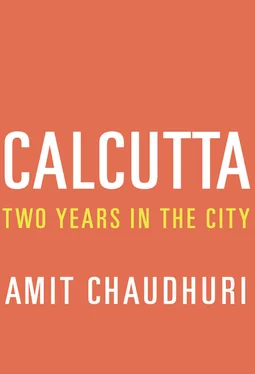* * *
People begin to arrive in the mornings. The young man, Raja, who cleans the cars in the building, strides in to collect the car keys; the cook rings the doorbell; then the part-time help, Kamala, my father’s daytime carer. They’re here from different parts of the city. You’re careful not to call them chakor any more. The word derives from chakuri or chakri , meaning “employment”; but it was mainly used to slight and humiliate. But chakor, like “servant,” reflects more poorly on the user today than on the person being alluded to; the preferred term is the neutral and politically acceptable (and slightly anodyne) kaajer lok —“people who work,” “working people.”
The chakor was often addressed as tui —the informal second-person pronoun, reserved for children, younger relatives, and best friends. This was the case irrespective of the age of the servant, though children were instructed to refer to older retainers as dada , or “older brother,” as in “Laxman dada,” while Laxman dada might also, paradoxically, refer to the master’s son as chhoto babu , or “young master.” Today, the kaajer lok are addressed as tumi —the semi-formal second-person pronoun for equals. However, the kaajer lok mostly address their employers as aapni— the formal second-person pronoun, used for superiors or older people, or as a respectful address for all strangers and acquaintances. It has no equivalent in English any more, but does in some European languages, the German sie being one. Just as you might address an older kaajer lok as aapni, or, if you’re exceptionally liberal or wish to make a point, all kaajer lok as aapni, there are some kaajer lok who might, familiarly, address you as tumi . In doing so, they might be being friendly, or unmindful, or provocatively democratic. If they do so, however, you don’t do anything about it; you don’t, for instance, say, “How dare you address me as tumi?” To do that would be anachronistic; an admission that you’re petty and uneducated, as politicians in small towns are, which, for the bhadralok, is a worse thing to be than being powerless. It’s a patchwork democracy, heavily weighted against the poor, the people who arrive at your door every morning — the help; the cook; the man who cleans the cars — but the middle class imagines it’s also weighted against them. People have a range of demands, the demands of the poor being least attended to; but no one has any rights in this situation — the proper context for rights hasn’t been created yet. It would be unfair on the middle class, or the bhadralok, to say they want a return to old-style feudal obeisance from the help, an unqualified servitude; but they do want conscientious work, honesty, long-term commitment, intelligence, and evidence of training in return for a basic salary (which has gone up minutely over the years, but is little more than a small honorarium), two days of paid “leave” in a month, a Puja bonus and gift, no notion of a minimum wage, no workers’ unions and, in effect, no hint of an independent life encroaching upon the middle class’s own. And so, the middle class hardly ever gets what it wants. The kaajer lok are unstable, uncommitted, they vanish for days without warning and then come back again one day, and are allowed to resume work after caveats are issued, unless some kind of replacement, who will also flatter to deceive, has been found. The middle class is dependent on this floating, flickering population, a few of whom will always materialise at its door in the morning, but fantasises frequently about living without it — mainly because it can’t stand the absence of commitment, the unwillingness to work, the air of being from a place that doesn’t accord with normal standards of behaviour and language, and also because it can’t bear to raise minimum standards of employment, salaries, and incentives. There’s no choice for the middle class, where kaajer lok are concerned, except to live from day to day, and indulge in fantasy and rhetoric.
Strictly speaking, there’s no bhadralok any more. Not only its heyday, its distinctive ethos — which produced the poets, novelists, painters, essayists; the Tagore family, Jamini Roy, Gopal Ghosh, Buddhadeva Bose, Bankimchandra Chatterjee, Kamal Kumar Majumdar, Bibhutibhushan Banerjee, Sudhir Khastgir, Jibanananda Das, Utpal Basu, Purnendu Pattrea; composers like Himangshu Dutta, Atul Prasad, Nazrul, Nachiketa Ghosh, and Salil Chowdhury; filmmakers like Paramathesh Barua, Satyajit Ray, Devaki Bose, and Ritwik Ghatak; the scientist Satyen Bose, who collaborated with Einstein in the Bose-Einstein statistics, and after whom the now-celebrated “boson” is named — that ethos is finished for good. Still, it’s possible to be a bhadralok — fleetingly, in a fitful way — in relation to the kaajer lok, and to Calcutta in general: as a sort of anomaly or exception, as a group of people who are around almost by accident.
The poor traditionally live in the basti . Basti is an Urdu word, meaning “neighbourhood”; in Bengali, however, it means “slum.” I remember the shock I felt when I was seventeen, when I first began to listen to Urdu ghazals, where the poet or singer might be pining for a woman living in a different basti from his own, because the word, with its connotations of squalor and anarchy, familiar to me from my visits to Calcutta, sounded incongruous in the ghazal’s fragrant world. These days, the person who comes in the morning as your domestic help doesn’t necessarily live in a basti, but often in developments for working-class folk, such as Subhasgram, clusters of houses with poor facilities and inadequate drainage and roadworks, but with shops and a local railway station. The trains are dangerously full in the mornings with commuters making their way to work in South Calcutta — so full that cooks and maids have sometimes reached us in the tranquillity of our flat in Ballygunge — a posh residential area — with a leg or arm bruised, having fallen off or been pushed off by another commuter on to the platform. These signs — of the wear and tear and abrasions of commuting, of the cook limping dramatically into the apartment and receiving only moderate sympathy from her colleagues and her employer — aren’t that unusual.
When a domestic begins to shout in an unseemly way at another domestic, or even at her employer, the word “basti” invariably makes a reappearance. “Don’t behave as if this is a basti,” the employer will instruct the domestic. “This is a bhadra person’s house.” In fact, the word might come up when two middle-class people are shouting unrestrainedly at each other. “Remember,” one might interrupt the other, “this is not a basti.” It doesn’t matter if neither person has ever seen a basti; it’s meant to bring back to them, indirectly, the presence, or the trappings, of that elusive thing, a bhadra existence.
Disasters occur in Calcutta, mainly from a stupendous disregard for norms and regulations, and from a mixture of greed and apathy — but not frequently enough for the domestics to arrive late at our doors in the morning. The women come wearing saris meant for the journeys workward and then homeward later in the evening — sometimes saris with atrociously colourful prints — which they discard and change for a drab work-sari after they’ve entered their small room by the kitchen. All this in six or seven minutes.
The city’s not at war with itself, and trains generally run on time, so there’s really no excuse for coming late. Despite this, a domestic might walk in an hour after she was due and claim the train was late, a story that may be contradicted by another domestic. Only on bandh or strike days do kaajer lok have an absolute, unarguable reason not to come. In comparison to many other cities, and despite occasional political conflagrations in the outskirts and neighbouring villages, despite “jungle mahal” further afield (the sovereign mini-states within states where Maoists reign), Calcutta is fairly safe to walk and travel through, and you won’t as a rule be robbed or shot or lacerated or raped (though you may be run over by a bus). This is not so much because the police are vigilant, but because the working and homeless people who populate the pavements at any given point of time are, despite their conditions, intrinsically bhadra. On the whole, there’s no good reason for domestics to delay reaching, or abscond from, their place of employment — except the obscure compulsions of their personal lives, compulsions which are almost always considered to be fictitious by their employers, and sometimes probably are. The two days of monthly paid leave are given to them reluctantly, and other swathes of time when they disappear without explanation, switching off the mobile phones that all of them have, or simply allowing them to ring endlessly, are viewed with helpless bafflement and outrage. (I’ve used the word “they” or “them” frequently, because it’s the other term —ora —besides kaajer lok most used to describe domestics.) When they return from their inexplicable absence — citing illness, or a relative’s illness or death, or a wedding, or a puja or festival — they’re usually accepted once more into the fold, not with open arms as the prodigal son or even one’s own son might be, but fairly meekly, with some moral remonstrances that are, on the whole, pretty unintimidating.
Читать дальше












